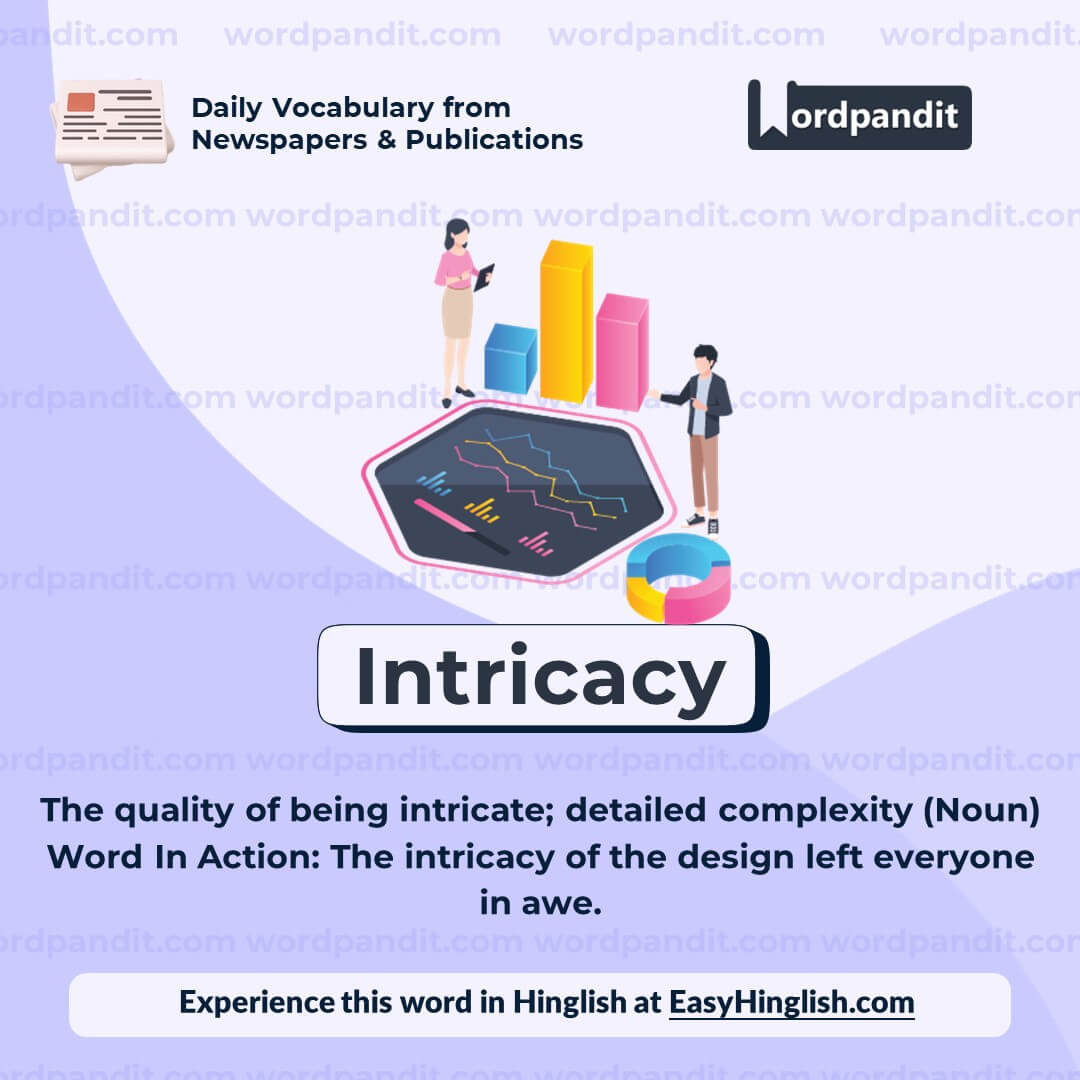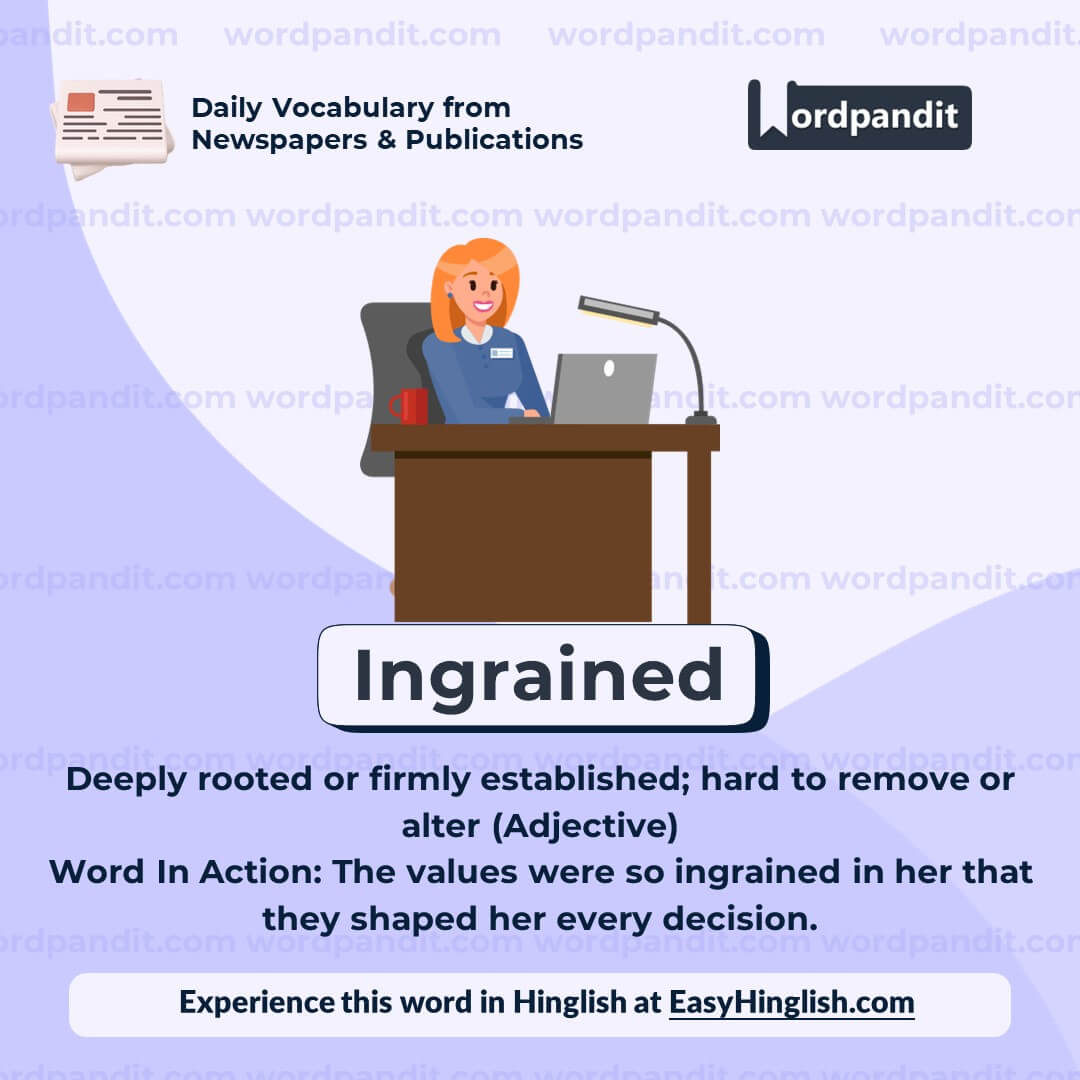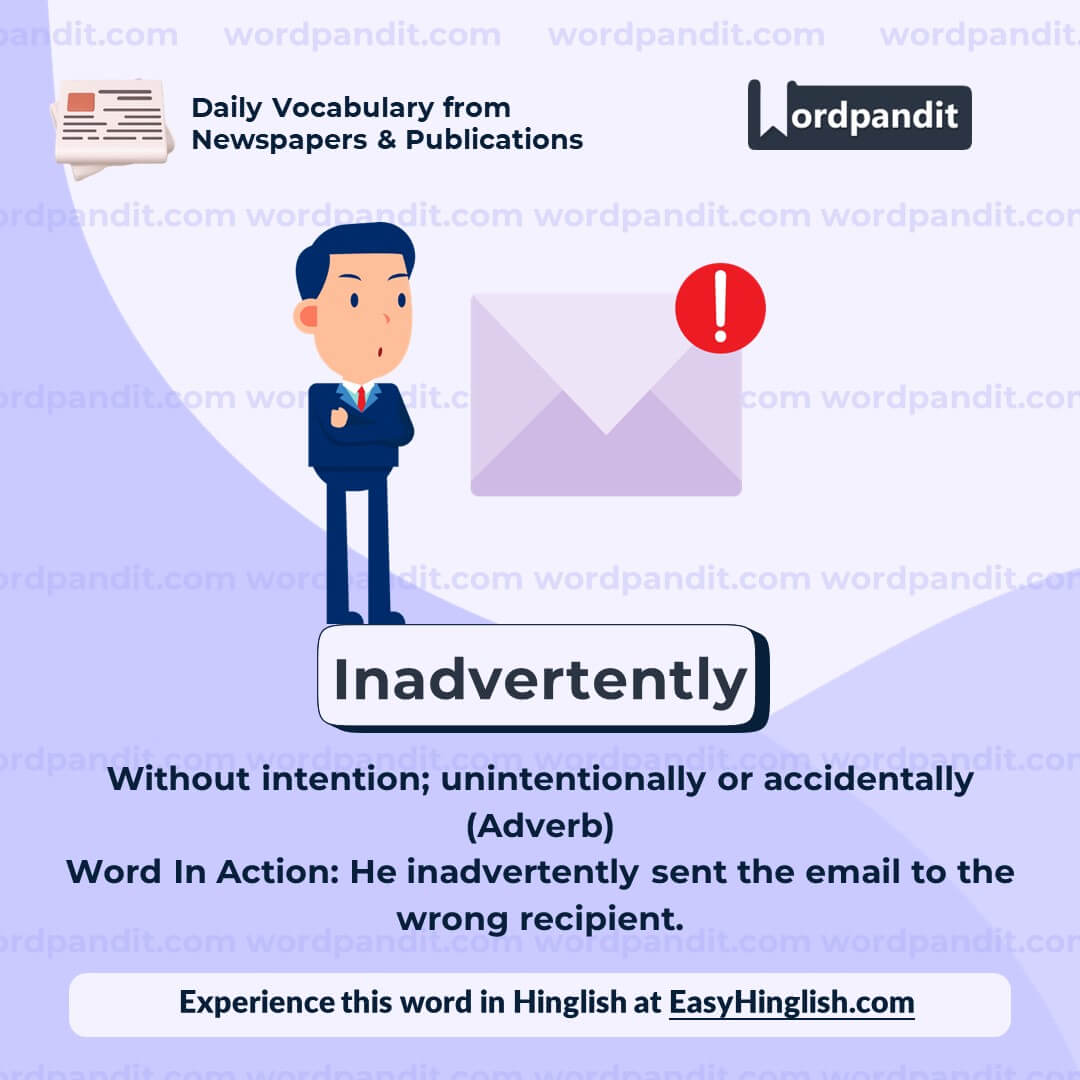Daily Vocabulary from Indian Newspapers and Publications
Welcome to Wordpandit’s Indian Vocabulary Hub
At Wordpandit, we understand the importance of staying rooted in the local context while expanding your language skills. This section focuses on enriching your vocabulary with words and phrases drawn from India’s leading newspapers and publications, ensuring you're learning vocabulary that is practical, relevant, and uniquely Indian.
Why Indian Sources Matter
We believe that the best way to master any language is by immersing yourself in local content. That’s why we carefully curate vocabulary from top Indian publications, including:
- The Hindu
- The Times of India
- The Economic Times
- Hindustan Times
- Live Mint
- The Indian Express
- And many others...
Stay Updated, Stay Relevant
With daily updates from Indian news sources, you’ll be consistently learning words that reflect the trends and shifts in Indian society and culture. Our focus is to provide vocabulary that enhances your understanding of the language in an Indian context.
How Wordpandit Supports Your Goals
Whether you’re preparing for exams, aiming to improve your professional communication, or simply want to stay connected with the latest Indian vocabulary, Wordpandit is here to guide you every step of the way.
Learn with a Practical Approach
Our interactive learning methodology includes real-world examples, engaging activities, and context-specific usage to ensure that every word becomes part of your active vocabulary.
Dive into Indian Vocabulary Today!
Why Choose Wordpandit?
Practical Learning: Focus on words you'll actually encounter in real-world reading, enhancing your comprehension and communication skills.
Diverse Content: From current affairs to scientific breakthroughs, our varied sources expose you to vocabulary across multiple domains.
Effortless Integration: Make Wordpandit a part of your daily routine. Just a few minutes each day can significantly boost your lexicon over time.
Your Path to Vocabulary Mastery
- Visit our Daily Vocabulary section regularly
- Explore new words and their usage in context
- Practice incorporating these words into your own writing and speech
- Track your progress as your vocabulary expands
Start Your Journey Today
Embark on your vocabulary enhancement journey with Wordpandit. By consistently engaging with our daily posts, you'll build a robust vocabulary that serves you well in academic, professional, and personal contexts.
Remember, a word a day keeps linguistic limitations at bay. Make Wordpandit your daily companion in the quest for vocabulary excellence!
WORD-1: Intricacy
Context:
"Every intricacy of the Palestinian condition has been documented threadbare by international institutions for over seven decades. How then, one might ask, could the international community allow this genocide to occur? The answer lies in an uncomfortable admission – diplomacy has done little to stem the relentless tide of erasure and replacement of the Palestinian people." - The Wire
Explanatory Paragraph:
The word "intricacy" refers to the complex, detailed, or nuanced nature of something, often involving multiple interconnected parts that require careful analysis or attention. It emphasizes depth and sophistication in understanding or dealing with an issue.
Meaning: The quality of being intricate; detailed complexity. (Noun)
Pronunciation: IN-tri-kah-see
Difficulty Level: ⭐⭐⭐ Intermediate
Etymology: From Middle English "intricacie," derived from Latin "intricatus," meaning entangled or perplexed.
Synonyms & Antonyms:
Synonyms: Complexity, sophistication, detail, subtlety
Antonyms: Simplicity, straightforwardness, clarity
Usage Examples:
- The intricacy of the ancient carvings left the archaeologists awestruck.
- Understanding the intricacy of the legal system requires years of study and experience.
- The intricacy of her storytelling kept the audience captivated for hours.
- He appreciated the intricacy of the puzzle and the challenge it presented.
Cultural Reference:
"Intricacies of the mind are often depicted in psychological thrillers, where characters navigate their own complex emotions and thoughts to solve mysteries or overcome challenges." - Cultural Commentary
Think About It:
Why do intricate details often go unnoticed in daily life, and how can paying attention to them change our perspective?
Quick Activity:
Pick a piece of art or a design around you and describe its intricacies in 3-4 sentences. Focus on the subtle details that might otherwise go unnoticed.
Memory Tip:
Think of "intricacy" as "in-trick-a-see" — something so detailed and complex, it almost feels like a trick that takes effort to see or understand clearly.
Real-World Application:
Intricacy is commonly used in contexts such as art, engineering, politics, and literature to emphasize the complex and detailed aspects of a subject. For instance, engineers must understand the intricacies of a machine's design to troubleshoot issues effectively.
WORD-2: Threadbare
Context:
"Every intricacy of the Palestinian condition has been documented threadbare by international institutions for over seven decades. How then, one might ask, could the international community allow this genocide to occur? The answer lies in an uncomfortable admission – diplomacy has done little to stem the relentless tide of erasure and replacement of the Palestinian people." - The Wire
Explanatory Paragraph:
The word "threadbare" is used metaphorically to describe something that has been overused, excessively examined, or rendered ineffective due to repetition or lack of substance. It originates from its literal meaning of fabric that is worn out and thin due to excessive use. In the context of ideas, arguments, or conditions, it highlights exhaustion or depletion from overexposure.
Meaning: Worn out to the point of being thin or shabby; overused to the point of losing effectiveness or originality. (Adjective)
Pronunciation: THRED-bair
Difficulty Level: ⭐⭐ Beginner
Etymology: From Middle English "thredebare," combining "thread" and "bare," referring to fabric worn thin through use.
Synonyms & Antonyms:
Synonyms: Worn, shabby, overused, hackneyed
Antonyms: Fresh, new, pristine, novel
Usage Examples:
- The old couch was so threadbare that you could see the stuffing poking through the fabric.
- His threadbare excuse for missing the meeting didn't convince anyone.
- After countless retellings, the once-intriguing story felt threadbare and uninspiring.
- The threadbare state of the country's infrastructure highlighted years of neglect.
Cultural Reference:
"Threadbare" often appears in literature to describe dilapidated settings or overused ideas. For instance, Charles Dickens uses vivid imagery of threadbare clothing to depict the poverty-stricken characters in his novels.
Think About It:
Why do some ideas or arguments become threadbare over time, and how can we prevent this from happening in our personal beliefs?
Quick Activity:
Write a sentence using "threadbare" to describe a non-physical object, like an argument, excuse, or belief.
Memory Tip:
Imagine a piece of fabric so worn out that the threads are bare. Similarly, think of "threadbare" ideas or excuses as being worn thin from overuse.
Real-World Application:
"Threadbare" is commonly used in political, social, and literary discussions to criticize arguments or ideas that lack originality or substance. It can also be used literally to describe worn-out physical objects like clothing or carpets.
WORD-3: Ingrained
Context:
"Merely an act of uncontrolled carnal desire; it is a manifestation of deeply ingrained societal prejudices. It reflects a pervasive culture that trivialises sexual violence and perpetuates notions of ideal victimhood, chastity, and female passivity. Our gendered laws inadvertently reinforce these biases, perpetuating the very culture they seek to dismantle." - The Wire
Explanatory Paragraph:
The term "ingrained" refers to something deeply rooted, firmly fixed, or embedded within a person, group, or culture. It often describes beliefs, habits, or prejudices that are so entrenched that they are difficult to change. These deeply established aspects are often the result of long-standing practices or societal norms.
Meaning: Deeply rooted or firmly established; hard to remove or alter. (Adjective)
Pronunciation: in-GRAINED
Difficulty Level: ⭐⭐⭐ Intermediate
Etymology: Derived from the Latin "in-" meaning "in" and "granum," meaning "grain," originally referring to dye or color deeply embedded in fabric.
Synonyms & Antonyms:
Synonyms: Deep-seated, entrenched, rooted, inherent
Antonyms: Superficial, temporary, transient, shallow
Usage Examples:
- The ingrained habits of his daily routine were hard to break.
- Her love for nature is ingrained in her, thanks to her upbringing in the countryside.
- Ingrained biases in the workplace can hinder efforts toward diversity and inclusion.
- Centuries of ingrained traditions have shaped the country's cultural identity.
Cultural Reference:
"Ingrained prejudices are a central theme in Harper Lee's novel *To Kill a Mockingbird*, where societal biases influence justice and morality in a racially divided community."
Think About It:
Why do certain ingrained beliefs or habits persist despite evidence or arguments against them?
Quick Activity:
Identify one ingrained belief or habit in your life. Write down why it might be difficult to change and what steps could help overcome it.
Memory Tip:
Imagine dye being soaked into fabric grain by grain. "Ingrained" beliefs are similarly soaked into our thoughts and hard to remove.
Real-World Application:
"Ingrained" is commonly used in discussions about societal norms, behaviors, and beliefs. For example, it can describe long-standing prejudices, cultural practices, or habits that shape personal and collective actions, often requiring conscious effort to reform or eliminate.
WORD-4: Inadvertently
Context:
"Merely an act of uncontrolled carnal desire; it is a manifestation of deeply ingrained societal prejudices. It reflects a pervasive culture that trivialises sexual violence and perpetuates notions of ideal victimhood, chastity, and female passivity. Our gendered laws inadvertently reinforce these biases, perpetuating the very culture they seek to dismantle." - The Wire
Explanatory Paragraph:
The word "inadvertently" means to do something unintentionally or by accident, often without realizing the consequences of the action. It is used to describe outcomes or actions that occur without deliberate intent, typically as a byproduct of something else.
Meaning: Without intention; unintentionally or accidentally. (Adverb)
Pronunciation: in-uhd-VERT-nt-lee
Difficulty Level: ⭐⭐ Beginner
Etymology: Derived from Latin "in-" meaning "not" and "advertentem" meaning "turning the mind to," emphasizing a lack of awareness or attention.
Synonyms & Antonyms:
Synonyms: Accidentally, unintentionally, mistakenly
Antonyms: Intentionally, deliberately, purposely
Usage Examples:
- She inadvertently left her phone at the café, realizing only after she had reached home.
- By forgetting to proofread, he inadvertently sent an email with several errors.
- The policy inadvertently favored large corporations over small businesses.
- He inadvertently offended his colleague with a poorly chosen remark.
Cultural Reference:
Inadvertent actions often play a significant role in historical events. For instance, the invention of penicillin was inadvertently discovered when Alexander Fleming noticed mold preventing bacterial growth in his petri dish.
Think About It:
How can unintended actions sometimes lead to both positive and negative consequences, and what does this teach us about the importance of mindfulness?
Quick Activity:
Write a sentence describing a time you inadvertently did something that led to surprising results, whether good or bad.
Memory Tip:
Break "inadvertently" into "in" (not) + "advertently" (focused) — it means not focused or attentive, leading to unintentional actions.
Real-World Application:
"Inadvertently" is commonly used to explain unintended outcomes in various fields such as law, science, and social policies. For example, in discussions about bias, it highlights how certain rules or actions can unintentionally reinforce inequalities or prejudices.
WORD-5: Imposition
Context:
"First term saw turbulent trade relations with India, marked by the imposition of tariffs on Indian steel and aluminium and threats to crack down on H-1B visas." - The Wire
Explanatory Paragraph:
"Imposition" refers to the act of enforcing or introducing something, such as a rule, tax, or burden, often without consent or in a way that creates difficulty for others. It can also refer to an unwelcome demand or requirement placed on someone.
Meaning: The act of introducing or enforcing something, especially burdensome. (Noun)
Pronunciation: im-puh-ZISH-un
Difficulty Level: ⭐⭐ Beginner
Etymology: From the Latin "impositio," meaning "to place upon," combining "in-" (on) and "ponere" (to place).
Synonyms & Antonyms:
Synonyms: Enforcement, burden, obligation, decree
Antonyms: Relief, removal, exemption, leniency
Usage Examples:
- The imposition of a new tax caused widespread protests among the citizens.
- He felt the imposition of extra duties at work was unfair and unnecessary.
- The teacher's imposition of strict rules ensured discipline in the classroom.
- The imposition of a curfew during the lockdown was meant to curb the spread of the virus.
Cultural Reference:
The imposition of the British tax policies, such as the Salt Tax in colonial India, sparked movements like Mahatma Gandhi's Salt March, emphasizing resistance to unfair rules.
Think About It:
How can governments balance the imposition of necessary regulations with the rights and needs of their citizens?
Quick Activity:
Write a sentence using "imposition" to describe a rule, demand, or expectation you recently encountered and how it affected you.
Memory Tip:
Think of "imposition" as "impose" + "position" — placing a burden or demand onto someone's position, often creating difficulty.
Real-World Application:
"Imposition" is widely used in discussions about policies, laws, or obligations in politics, economics, and daily life. For example, it can describe tariffs in trade, restrictions in governance, or even personal demands in relationships.


















